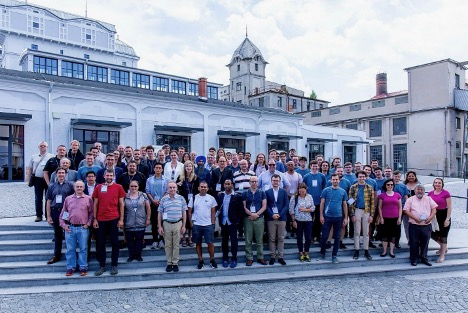Climate Modeling at the 9th European Seminar on Computing (ESCO)
The 9th European Seminar on Computing was held on June 10-14, 2024 in Pilsen, Czech Republic and online. This series of international conferences focuses on modern practices in scientific computing and visualization for a variety of application areas including climate. A minisymposium entitled “Advanced Computational Methods for Climate Modeling and Analysis” was organized for ESCO by Irina Tezaur (SNL), Mauro Perego (SNL), Kara Peterson (SNL), Balwinder Singh (PNNL), Andrew Steyer (SNL), and Francisco de Melo Virissimo (Granthan Research Institute). The minisymposium included in-person and virtual talks describing new and ongoing research in the development of accurate and tractable “next-generation” models for stand-alone climate components (for example, atmosphere, ocean), as well as talks addressing the challenges in coupling climate components for integration into ESMs. Many talks related to E3SM and its ecosystem projects, including:
on atmosphere:
- Sara Calandrini (LANL), Capturing the QBO-MJO Connection with E3SMv3 Nudged Experiments.
- Mike Schmidt (SNL), TChem – a Performance Portable Chemistry Solver for Atmospheric Chemistry.
- Balwinder Singh (PNNL), Software Modernization of the 4-mode Modal Aerosol Module (MAM4) for Global Kilometer-scale Earth System Modeling.
- Mark Taylor (SNL), Cloud Resolving Modeling on Exascale Computers.
on land-Ice:
- Max Carlson (SNL), Automatic Performance Tuning for Albany Land-Ice.
- Trevor Hillebrand (LANL), Towards Actionable Predictions of Sea-level Rise With MALI and E3SM.
on sea-ice:
- Devin O’Connor (SNL), Modeling sea ice dynamics with a discrete element method: an overview of the DEMSI project.
- Deborah Sulsky (UNM), Sea Ice Modeling in DOE’s Energy Exascale Earth System Model (E3SM).
on ocean:
- Coleman Blakely (ANL), Accurately Capturing Coastal Water Levels through Variable Resolution Mode Splitting in MPAS-Ocean.
- Hyun Kang (ORNL), A GPU-accelerated Implementation of the Semi-implicit Barotropic Solver for the MPAS-Ocean.
- Irena Vankova (LANL), The Effects of Including Antarctic Subglacial Meltwater Flux to the Ocean in the Energy Exascale Earth System Model.
- Luke van Roekel (LANL), Ocean and Wave Modeling at Exascale in the Energy Exascale Earth System Model.
on river and land:
- Chang Liao (PNNL), Advances in River Modeling in High Spatial Resolution Land Surface Model.
- Dan Lu (ORNL), Advanced Machine Learning Techniques for Land Surface Modeling.
- Dan Ricciuto (ORNL), Assimilating Observations From Vulnerable Ecosystems Into a High-resolution Land-surface Model.
- Khachik Sargsyan (SNL), Spatio-Temporal Surrogate Construction and Calibration of E3SM Land Model.
on the coupled system:
- Darren Engwirda (LANL), (Almost) Energy Conserving Momentum Closures for Ocean and Atmosphere Models.
- Jayesh Krishna (ANL), I/O Challenges for ESM Simulations at High Resolution – an E3SM Perspective.
- Vijay Mahadevan (ANL), Boosting the Numerical and Computational Performance of the E3SM Coupler.
- Salil Mahajans (ORNL), Simulating Climate and Land Biogeochemistry Response to Stratospheric Aerosol Injection in Overshoot Scenarios With DOE’s E3SM.
In total, more than 40 speakers participated in this minisymposium in person and virtually, which was a new record for ESCO (Fig. 1). The next ESCO conference will take place in June 2026.
This article is a part of the E3SM “Floating Points” Newsletter, to read the full Newsletter check:



